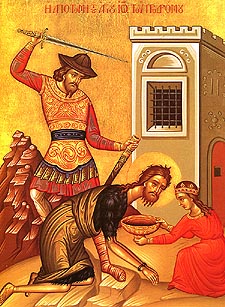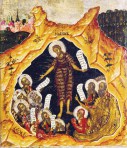|
|||
|---|---|---|---|
| This weekly bulletin insert complements the curriculum published by the Department of Christian Education of the Orthodox Church in America. This and many other Christian Education resources are available at http://dce.oca.org. | |||

The Church solemnly remembers the Beheading of John the Baptist. John dared to reprove a powerful man, King Herod. Herod knew John to be a just and holy man, and even benefited from listening to John's words. But his awareness of his own moral weakness also made him fear this bluntly truthful preacher. The reason for John's reproof of Herod was that the king unlawfully married his brother's wife, Herodias. Furious at what she saw as a gross insult, she convinced Herod to imprison John. She really wanted him executed, but Herod hesitated, because John was revered as a prophet among the people. But her chance came at Herod's birthday celebration. Herodias used her daughter Salome to entice Herod with a sensuous dance, knowing he would lavishly promise to grant any request the girl made. Her request startled and saddened him, but he couldn't lose face in front of his important guests. John's severed head, which Herodias had told her daughter to ask for, was delivered on a charger, or large plate. How did Jesus react to the news of His cousin John's death? Matthew 14: 13 tells us that He went into a "lonely place apart" but was soon followed by a crowd. He did not take time alone to grieve, but compassionately began healing the sick among them. Saint Justin Popovich, along with other commentators on John's beheading, asks this question: Why didn't Jesus raise John from the dead, as He had raised, for instance, the daughter of Jairus? Why not bring this man back to life to continue his important work? Saint Justin answers the question by saying that among John's many titles—Baptizer of the Lord, Holy Forerunner, Seal of All the Prophets, God-Sent Messenger—there is another he might be given, and that is Apostle to those in Hades, the Dead. Father Justin writes: "The Forerunner had to become the Forerunner in Hades as well, in death's kingdom, so that he might preach there as well: Lo, the One whom all you Righteous Ones have been awaiting...is working signs and wonders such as you, all of you taken together, have never seen. And lo, I go before Him to preach to you as well this best of all news: He will come down here to us as well...the kingdom of death will be destroyed when, in a little while, the Lord appears here, and you will be led out of this horror and into heavenly joy, into the Kingdom On High."
Those in Hades had to be prepared for something new: a Messiah who could lead them to eternal life. Mark 2: 18-22 calls us also to be ready for something new. Christ compares His saving message to new wine, which requires new wineskins, because old ones can't expand enough to hold it. Can we "expand" our minds to receive Christ's message? John the Baptist was willing to give his life to preach the Good News to those in Hades. We, still having our lives, can honor him by hearing it and rejoicing in it. |
|||

